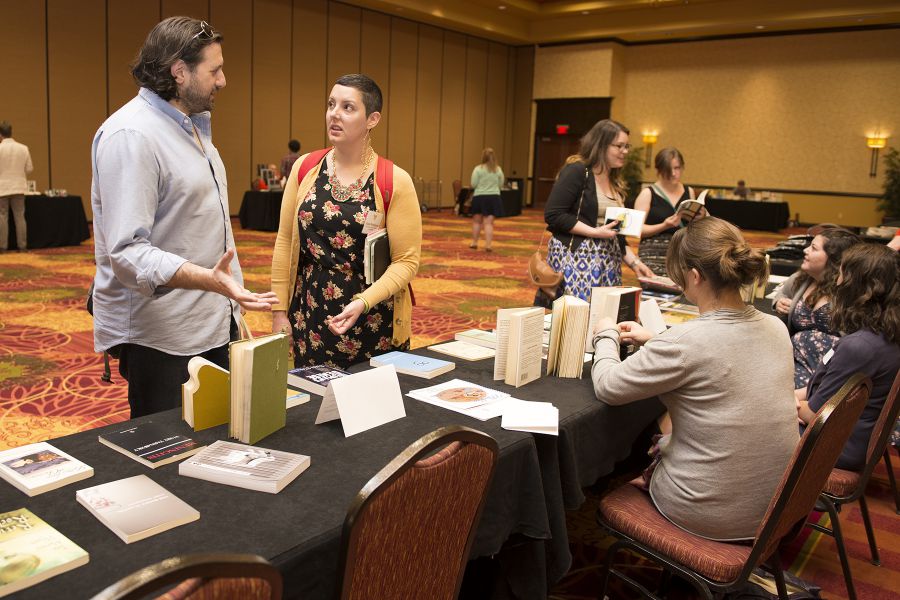“It’s weird to feel like you miss someone you’re not even sure you know.”
—David Foster Wallace, Infinite Jest
Packed among their conference programs and presenter notes, attendees of the first-ever David Foster Wallace Conference in Normal carried along copies of the behemoth books Infinite Jest and The Pale King as if they weighed nothing at all.
More than 125 people gathered from all over the world on May 22 and 23 to explore, dissect, and digest the works of the author, who has been called one the most influential writers of his generation.
“It took me about 20 hours to get here,” said Joel Roberts, who studies literature at the University of Brighton in England, “but it has been rather surreal to stand where Wallace stood. I first read Infinite Jest in 2011. I traveled that summer, and saw none of the world because I was busy reading David Foster Wallace.”
Wallace was a faculty member at Illinois State University when he completed Infinite Jest, often referred to as one of the greatest novels of the late 20th century. Several conference attendees admitted taking a mini-pilgrimage to his former office in Stevenson Hall.
“There is a bit of reverence when talking about him,” said Alexander Moran, who came from North Carolina for the conference. “But it is humanizing as well. I sat next to one of his former colleagues at breakfast, who showed me an old manuscript of Wallace’s that was scribbled with his notes. I thought, ‘Should you be carrying that around that like?’ It makes you realize he was human, and he was someone’s colleague.”
“Having the conference here speaks to the heritage of his work,” said Jane Carman, organizer of the David Foster Wallace Conference and co-director of the Publications Unit at Illinois State. Carman believes Wallace “has not been recognized as he should be. He has not been celebrated enough for his contributions to contemporary literature.”

Ryan Blanck, a high school English teacher from Los Angeles, gives his presentation, titled “The Works of David Foster Wallace Brought to Three Dimensions in Lego Sculptures.”
Students at the conference
Some Illinois State students had the chance to see the conference come together firsthand.
“It was amazing to see the planning. We’re usually working on the print output at the (Publications) Unit, but this is more of a human output,” said Illinois State student Bryan Reid, who also presented at the conference. He spoke of the “ooze of creative excess” that is blurring the lines of literary producers, consumers, and critics in his talk “The Excess-Loving Publishing Habits of Cyborg Garbage-Eaters.”
Reid was one of 85 presenters who explored all things Wallacian with session titles that ran the gamut, including “Bob Hope and the White Whale: Destructive Monomania in Infinite Jest and Moby-Dick”; and “The Poetry of the Tax Code as the Silence of the Tornado: Metaphysics and the Unfolding of Being in David Foster Wallace’s The Pale King.”
Ryan Blanck, a high school English teacher from Los Angeles, spoke about addiction earlier in the day, his talk punctuated with added notes.
“It wouldn’t be a David Foster Wallace Conference without a footnote,” he joked of the author who was famous for his multipage footnotes within articles. Blanck returned in the afternoon with one of the more unique presentations titled “The Works of David Foster Wallace Brought to Three Dimensions in Lego Sculptures.”
“The community of Wallace readers is a vibrant and interesting one,” said Matthew Luter of Webb School in Knoxville, Tennessee, who gave a presentation talking about the connections between Wallace and the Brat Pack of the 1980s. “We’re excited to get others to read Wallace and talk about him.”
Carman hopes the conference will work to ensure Wallace’s literary legacy. A large book auction held at the conference will help to endow the David Foster Wallace Memorial Fund, which will establish a speaker series at Illinois State as well as a student scholarship.
“It is also our hope to fund a Ph.D. candidate in the Publications Unit,” she said.
For conference attendees like Jill Braithwaite of Minneapolis, Wallace’s legacy is already assured.
“He was a brilliant writer who spoke of timeless human values and struggles in the post-modern era. But more than that, he connected with readers. He spoke to them,” she said.
Rachel Hatch can be reached at rkhatch@IllinoisState.edu.


